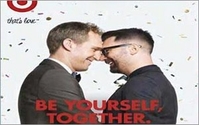LGBT Advertising: Authentic Or Courting Publicity?
- by Larissa Faw , April 23, 2014
 Over the years, brands have increasingly embraced lesbian, gay, bisexual, and transgender (LGBT) individuals as part of their marketing programs. Target, Chevy, J. Crew, and Amazon are just a few
well-known brands to recently feature same-sex couples in their advertising.
Over the years, brands have increasingly embraced lesbian, gay, bisexual, and transgender (LGBT) individuals as part of their marketing programs. Target, Chevy, J. Crew, and Amazon are just a few
well-known brands to recently feature same-sex couples in their advertising.
Most Americans applaud these game-changers. The vast majority of Americans (80%) feel that showing LGBT characters in ads simply reflects the reality of society today and view brands who are embracing the LGBT community as brave (72%), according to a new study from J. Walter Thompson research unit JWT Intelligence.
The “LGBT Inclusive Ad Study,” which utilized the shop’s ‘Sonar’ online research tool, explores consumers' feelings about these ads. Millennials (41%) are more likely than Gen Xers (28%) and Baby Boomers (33%) to notice LGBT ads, as are those who regularly attend religious services versus those that don't (42% vs. 27%).
advertisement
advertisement
Still, acceptance of LGBT ads among mainstream Americans is complicated. Americans themselves say they are accepting of them: 71% don't care who brands show in ads. Yet at the same time, a similar percentage (69%) say other Americans would prefer not to see LGBT ads.
Nearly half (45%) don't know why brands would feature LGBT individuals and 37% feel TV ads are no place for these types of ads.
Nonetheless, most Americans (68%) feel that all brands -- not just progressive companies -- are entitled to show LGBT couples in their ads, including traditional consumer packaged goods brands, spirits, cars, tech, retail and fashion.
Yet brands must be judicious in the way they execute LGBT-inclusive campaigns because consumers are skeptical about their intentions, the JWT study finds. Indeed, despite good intentions, many Americans think brands that show LGBT couples in their ads are courting publicity (53%) or controversy (42%).
"Since consumers consider brands that depict LGBT people in their ads to be progressive and brave, there is opportunity for brands to take a leadership role, putting a stake in the ground by standing up for communities that brands might feel could use a mainstream voice. While some brands will surely take a wait-and-see approach, we suspect that others -- likely the market leaders -- will see what’s happening and begin to produce more LGBT-inclusive ads in the near future," says the report.
Generally, the more subtle creative expressions generate a dramatically more positive response. Above all, LGBT ads must be authentic. As such, both Target and Amazon Kindle recently ran LGBT campaigns, yet 92% of Americans liked the Kindle spot, while only 84% liked Target's ad.
The reason? Consumers reacted to the overt display of affection in the Target advertising, per the study.
These perceptions are shared by the LGBT community, who are wary of pandering and being used by advertisers. Some 85% of LGBT individuals liked the Kindle ad versus 48% who liked the Target spot. More than six in 10 LGBT members (61%) and 2% of non-LGBT individuals thought the Target ad was controversial, while 28% of LGBT and 3% of non-LGBT individuals said the same about the Kindle ad.
The study notes that LGBT ads are still relatively rare in mainstream media. Two-thirds of Americans rarely or never see these ads. Men are more likely than women (42% vs. 30%) to notice LGBT ads, but women are more likely than men (62% vs. 32%) to think these ads are okay.



"These perceptions are shared by the LGBT community, who are wary of pandering and being used by advertisers. Some 85% of LGBT individuals liked the Kindle ad versus 48% who liked the Target spot."
Members of the LGBT community are often wary of any corporation advertising to them who has been called out for discriminatory practices in the past. That would include Target, which would definitely impact the results of a study like this one, and should have been included as a screening question.